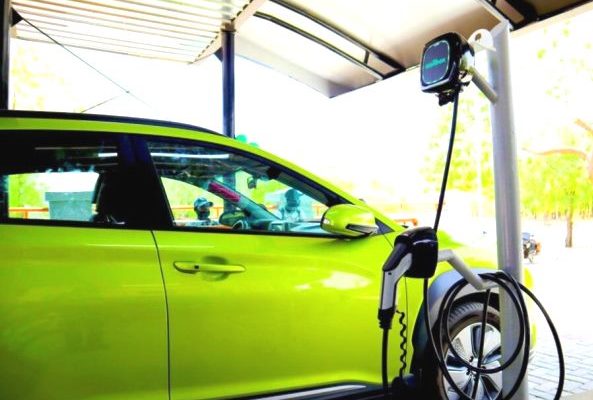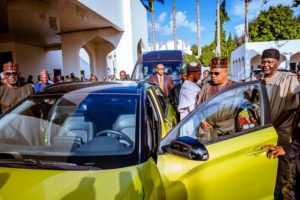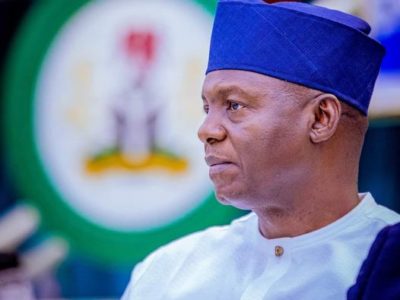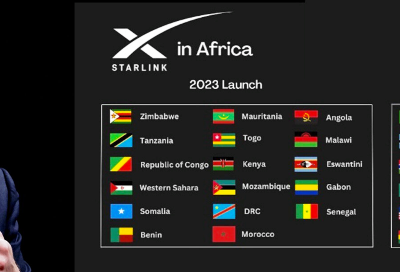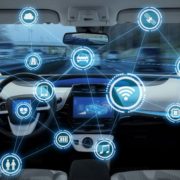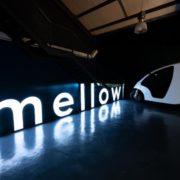Matters eRising with Olusegun Oruame
The National Automotive Design and Development Council (NADDC) has remained at the forefront of making Nigeria to become one of the major countries in vehicle electrification and to also achieve its net-zero emissions target by 2060.
RELATED: Nigeria to become hub for vehicle electrification as NADDC gears forward with implementation plans
Led by the very perceptive auto designer, Jelani Aliyu, the NADDC appears to have sharpened its statutory role in formulating policies, regulations, and incentives to support the adoption of electric vehicles (EVs) in Nigeria. It is championing the provision of financial incentives, tax breaks, and regulatory support that will encourage public and private entities to invest in and adopt electric mass transportation solutions.
The NADDC’s commitment to vehicle electrification in Nigeria and the resultant local push by the likes of Innoson Motors, Hyundai Kona EV and Jet Motors will come to nought without strategic support.
In mid-July at a validation workshop in Abuja, the NADDC announced that the Electric Vehicle Development Plan in Nigeria has entered the final stage for ratification and implementation. Its Director General, Aliyu, gleefully announced that armed with an EV Development Plan, the country was set to address decades of dependence on fossil fuel and joined the rest of the progress world in adopting clean energy to power its auto industry.
The EV Development Plan has a timeframe for execution; has specific percentages and targets for local production of electric vehicles and a benchmark of at least 30% local production while also championing intellectual property in way that ensures sustainability of the entire ecosystem anchored on high local content input.
Despite the promising prospects, several challenges must be urgently addressed for successful EV adoption in mass transportation. These include the high upfront cost of EVs, limited public awareness, inadequate charging infrastructure, and potential technical skill gaps for EV maintenance and repair.
How else can the local manufacturers or other stakeholders in the EVs, CNG value chain grow without enforced local patronage?
The NADDC boss appears to be very conversant with these challenges even as he urges for a wider adoption of EV across various levels of governments and sectors. But government itself must lead both the conversations and the initiatives to build a robust and thriving national EV environment in Nigeria.
Yes! The EV Development Plan mandates federal, state, and local governments, private companies executing government contracts to purchase and patronise EVs so as to drive adoption across the country. It also highlights the need for collaboration with the private sector to deploy charging points along highways and road so as to make the EV ecosystem more dependable.
EV ecosystem needs more than just a plan
But an EV ecosystem needs more than just a plan. It requires willpower and undiluted commitment. Sustainable cost-effective transportation solutions woven around EVs and compressed natural gas (CNG) vehicles and readily supported by abundant renewable energy or natural resources, such as lithium and gas may still not beat the attraction for the more costly petrol and diesel. Reason? If people are not made to be aware or encouraged to adopt renewable alternatives, they will remain at the primitive bottom of energy consumption.
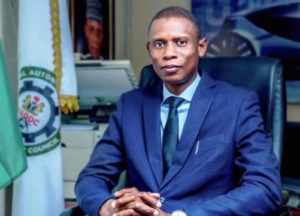
Jelani Aliyu: Forging ahead with the EV revolution
That is why it matters for government to pass the 2023 National Automotive Industry Development Plan Bill and provide legislative cover for foreign direct investment (FDI) that will aid the development of indigenous vehicles with local content and intellectual property designed to address Nigeria’s extreme conditions.
Aliyu rightly argued that the vehicle ecosystem can further be strengthened by a policy thrust to fund Vehicle Finance Scheme (VFS) targeting the acquisition of EVs through affordable nationwide staggered payment scheme and the enforcement of Executive Order 003 mandating the procurement of locally produced vehicles by government ministries, departments, and agencies (MDAs) as well as private companies working as contractors.
How else can the local manufacturers or other stakeholders in the EVs, CNG value chain grow without enforced local patronage?
The NADDC’s commitment to vehicle electrification in Nigeria and the resultant local push by the likes of Innoson Motors, Hyundai Kona EV and Jet Motors will come to nought without strategic support.
Going EV or CNG is no longer a subject of debate but a subject of when. When will government drive the initiative to become a part of our national life through the assertion of the needed willpower?
EVs will foster energy independence and long-term sustainability
Shall we reiterate the benefits that given the growing concerns about climate change and environmental degradation, the adoption of electric vehicles for mass transportation can significantly reduce greenhouse gas emissions and air pollution, improving air quality and public health in Nigerian cities? Or that by shifting towards electric vehicles, Nigeria can reduce its dependence on fossil fuels and potentially use its abundant renewable energy resources (solar, wind, hydro) to power EVs, fostering energy independence and long-term sustainability?
Vice President Kashim Shettima recently announced that though Nigeria was rich in natural resources like crude oil, which has historically been the dominant source of fuel for transportation, the country was making a radical shift to the mass deployment of compressed natural gas (CNG) vehicles in all states for public transportation.
The merits are more. The fight to reduce urban congestion and improve air quality especially cities like Port Harcourt and Lagos is easier won with EVs and CNG. A large market for EVs supported by a good policy thrust will attract foreign investments from electric vehicle manufacturers and technology providers; and infrastructure development is equally better guaranteed as the adoption of electric mass transportation would require the development of a robust charging infrastructure across the country.
The NADDC under Aliyu has begun a journey that requires the support of all stakeholders. Everyone can win to rework Nigeria’s auto industry with an EV or CNG infused in its DNA. The journey cannot stop now.


